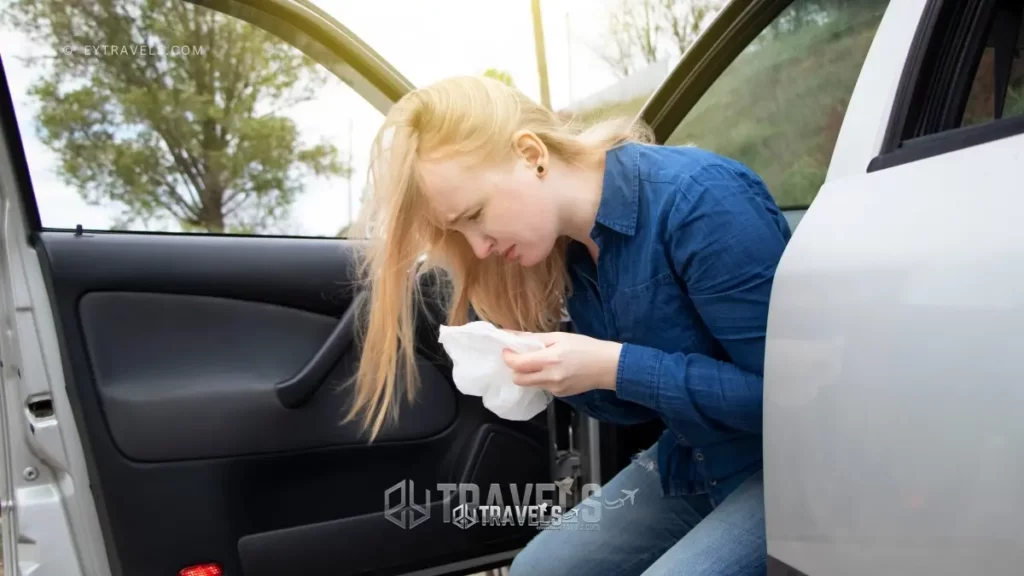13 Tips to Prevent Vomiting While Traveling: Easily Avoid Motion Sickness
Say Goodbye to Nausea: Expert-Approved Hacks for Traveling Without Vomiting
As you're excitedly planning a road trip or boarding a plane to your dream destination. The anticipation builds, and you can't wait to embark on an adventure-filled journey. But suddenly, that familiar queasy feeling starts creeping up inside of you – motion sickness is rearing its ugly head again. Vomiting Prevention While Traveling: 13 Proven Tips to prevent vomiting while traveling. Don't let nausea ruin your travels – discover practical strategies for a comfortable and vomit-free journey.
Motion sickness affects thousands of people worldwide and has the unfortunate ability to turn any travel experience into a nightmare. From feeling nauseous to uncontrollable vomiting, this condition can quickly deflate the excitement of exploring new places. Understanding what causes motion sickness and recognizing its symptoms are crucial steps towards finding relief.
Tips to Prevent Vomiting While Traveling
In this article, we'll delve into the intricacies of motion sickness, discussing why some individuals are more prone to it than others. We'll explore common symptoms experienced by those susceptible to motion sickness and offer practical tips that will help you prevent vomiting while traveling – ensuring smoother journeys without sacrificing your wanderlust dreams! So sit back (or brace yourself), take note of these game-changing strategies, and let's pave the way for vomit-free travels!
#1. Choose your seat wisely:
When it comes to preventing motion sickness, choosing the right seat can make all the difference. In airplanes, try to secure a window seat as it allows you to have a fixed point of reference by looking outside at the horizon. This visual stability can help reduce feelings of nausea and dizziness. If you're on a train or bus, sitting near the front of the vehicle may also provide more stability, as the movement is less pronounced compared to seats towards the back.

Another pro tip for combating motion sickness is focusing on distant objects or fixing your gaze on a stable point in the distance. By doing this, your brain receives consistent sensory information from both your eyes and inner ear, which helps alleviate that queasy feeling in your stomach as you travel.
Additionally, if you're prone to motion sickness while traveling by boat or ship, consider booking a cabin with windows and access to fresh air. Being able to see through windows and having access to natural airflow can help maintain equilibrium within your body by minimizing sensory conflicts between what you see and feel onboard.
Remember that prevention is key when it comes to motion sickness – making these thoughtful seating choices will significantly improve your chances of avoiding uncomfortable bouts of vomiting during travel.
#2. Manage sensory input:
Controlling the environment around you plays a crucial role in overcoming motion sickness. One effective way to manage sensory input and prevent vomiting is by controlling visual stimuli. When in a moving vehicle, avoid fixing your gaze on objects inside the vehicle, such as reading materials or electronic devices. Instead, focus on distant objects or landscapes outside the window. This helps reorient your sense of balance and reduces feelings of nausea.
Another sensory input to consider is auditory sensations. Background noises can contribute to motion sickness for some individuals. Consider using earplugs or noise-canceling headphones during travel to minimize any auditory triggers that may intensify the onset of nausea. By reducing unnecessary sounds, you can create a more calming environment and decrease the chances of vomiting while traveling.
Remember, managing your sensory inputs goes beyond just relying on medication; it empowers you with practical strategies that promote comfort and well-being throughout your journey.
Take preventative measures: – Avoid heavy meals before traveling as they can exacerbate motion sickness symptoms. – Stay hydrated and sip on ginger tea or suck ginger candies known for their anti-nausea properties.
#3. Mind over matter: Overcoming motion sickness with mental techniques
Practicing deep breathing exercises or meditation techniques during travel can help calm the mind and alleviate feelings of nausea.
- Deep breathing involves taking slow, deliberate breaths in through the nose and out through the mouth, focusing on expanding the stomach with each inhalation. This technique helps regulate your breathing patterns and promotes relaxation, helping to ease symptoms of motion sickness.
- Another effective strategy is distraction. Engaging your mind with other activities can divert your attention from any queasiness you might be experiencing. Listening to music or audiobooks, reading books or magazines, or playing games on electronic devices are great ways to keep yourself occupied while traveling. These distractions not only take your focus away from potential triggers for motion sickness but also provide an enjoyable way to pass the time.
By practicing these mental techniques like deep breathing and distraction methods, you can train your mind to overcome feelings of nausea while traveling. Remember that it might take some practice before you notice significant changes, so persevere and stay patient as you experiment with different strategies that work best for you during different modes of transportation.
#4. Medications and remedies to Prevent Vomiting While Traveling
Medications and remedies play a crucial role in preventing motion sickness and alleviating the symptoms of nausea. Over-the-counter medications specifically designed for this purpose can be highly effective. One such medication is dimenhydrinate, which is commonly found in products like Dramamine or Gravol. These medications work by suppressing the signals in the brain that trigger vomiting, making them a popular choice among travelers.
In addition to over-the-counter options, herbal remedies are also worth considering. Ginger supplements have long been known for their anti-nausea properties. Ginger works by calming the stomach and reducing inflammation, providing relief from feelings of queasiness and aiding digestion.

For those who prefer natural remedies, chewing on ginger candies or sipping on ginger tea while traveling can also offer some relief from motion sickness-related symptoms. It's important to note that while these remedies are generally well-tolerated, it's always advisable to consult with a healthcare professional before starting any new medications or treatments.
By incorporating over-the-counter medications designed specifically for motion sickness prevention or exploring herbal options like ginger supplements, individuals prone to motion sickness can significantly reduce their chances of experiencing vomiting during travel. So whether you're taking a road trip or embarking on an adventure-filled plane ride, these medication and remedy choices may make your journey more enjoyable and vomit-free!
#5. Eating Light Before Traveling to Avoid Motion Sickness:
Nothing ruins a journey more than feeling queasy and nauseous on the road. However, by making wise choices in your pre-travel meal plans, you can minimize the chances of motion sickness ruining your trip. One crucial aspect to consider is avoiding heavy meals before embarking on your adventure. Eating large portions or indulging in greasy and fatty foods can put additional strain on your stomach, making it more prone to motion sickness.
Instead, opt for lighter meals that are easy to digest. Foods such as lean proteins like chicken or fish, whole grains like quinoa or brown rice, and fresh fruits and vegetables can help replenish energy without weighing you down during travel. These light options provide necessary nutrients while ensuring that they don't overwhelm the stomach's digestion process.
Additionally, there are specific foods known for their anti-nausea properties that could be beneficial when consumed prior to traveling. Ginger has long been used as a natural remedy for nausea and has shown promising effects in reducing motion sickness symptoms. You might consider sipping ginger tea or eating some crystallized ginger before heading out on your excursion.
Another food with potential benefits is peppermint which has soothing properties for an upset stomach. A cup of peppermint tea or sucking on a peppermint candy can work wonders when trying to prevent nausea during travel.
By adopting these simple dietary adjustments and incorporating gentle nutritional choices into your pre-travel routine, you'll be well on your way to enjoying a comfortable ride without the misery of vomiting due to motion sickness
#6. Staying hydrated:
It's no secret that staying hydrated is crucial for overall health, but did you know it can also help prevent motion sickness? Hydration plays a significant role in regulating your body's balance and equilibrium, reducing the chances of experiencing nausea or vomiting while on the move.
When traveling, especially by air or road, the dry environment can dehydrate your body quickly. Dehydration not only exacerbates motion sickness symptoms but can also lead to fatigue and dizziness. To combat this, make sure to drink water frequently throughout your journey. Keep a bottle of water handy and take small sips at regular intervals. It's better to hydrate before feeling thirsty as thirst may already be an indicator of dehydration.
For those who struggle with the taste of plain water, consider flavoring it with slices of lemon or cucumber to make it more enticing.
- You could also opt for electrolyte-rich drinks like coconut water or sports beverages if allowed onboard flights or available during pit stops.
- Aim for at least 8-10 cups (64-80 ounces) of fluid intake per day while traveling – this will go a long way in keeping motion sickness at bay and ensuring a comfortable journey.
By prioritizing hydration during your travels, you'll not only feel refreshed but also reduce the risk of vomiting due to motion sickness significantly.
#7. Find a Comfortable Seating Position:
When it comes to preventing motion sickness, your seating position plays a crucial role. Opt for a seat where you can see the horizon and have maximum stability. Being close to windows or facing forward can help provide visual cues that reduce the disconnect between what your eyes see and what your inner ear senses. Additionally, try adjusting the seat's recline angle to find the most comfortable position for you.

#8. Keep Your Eyes on the Horizon:
Keeping your gaze fixed on a stable object in the distance can significantly reduce nausea and prevent vomiting while traveling. Focusing on stationary points such as hills, buildings, or distant horizons helps minimize conflicting sensory information that contributes to motion sickness symptoms.
#9. Take Frequent Breaks:
If you're embarking on a long journey by car or train, taking regular breaks is essential for combating motion sickness-induced vomiting. Stepping outside into fresh air and allowing yourself time to rest can help alleviate symptoms associated with prolonged travel.
#10. Control Your Breath:
Deep breathing exercises are effective in managing motion sickness-related discomforts like vomiting. Practice slow and controlled breathing by inhaling deeply through your nose and exhaling slowly through pursed lips frequently throughout your journey.
#11. Customize Air Flow:
Proper ventilation can make all the difference when trying to avoid motion sickness-induced vomiting during air travel or drives with closed windows. Ensure there is adequate air circulation wherever possible by opening windows slightly or turning air vents towards you.
#12. Curb Food Intake before Traveling:
Eating light meals with low-fat content before embarking on any trip will work wonders in reducing instances of nausea and subsequent vomiting bouts during travel hours.Try avoiding greasy food items or consuming heavy meals right before traveling,.
#13. Try Over-The-Counter Remedies :
There are several over-the-counter medications available specifically designed to combat motion sickness.These include antihistamines which help control nausea-causing hormones and alleviate symptoms.It is advisable to consult a healthcare professional or pharmacist regarding the right medication and dosage for your specific needs.
In Summary
By implementing these practical tips, you can significantly reduce the risk of motion sickness-related vomiting while traveling, ensuring a more enjoyable journey. Remember, prevention is key when it comes to mitigating discomfort caused by motion sickness, so be proactive in taking care of yourself before and during your travels.
FAQs
Q1: What is motion sickness?
A1: Motion sickness is a condition characterized by nausea, dizziness, and vomiting caused by motion or movement.
Q2: What are the common symptoms of motion sickness?
A2: Common symptoms of motion sickness include nausea, vomiting, dizziness, sweating, and pale skin.
Q3: How can I prevent motion sickness while traveling?
A3: You can prevent motion sickness by sitting in the front seat of a car, focusing on the horizon, and avoiding reading or looking at screens during travel.
Q4: Are there any medications that can help prevent motion sickness?
A4: Yes, over-the-counter medications such as dimenhydrinate and meclizine can help prevent motion sickness.
Q5: Can ginger help with preventing motion sickness?
A5: Yes, ginger has been shown to be effective in reducing nausea and can help prevent motion sickness.
Q6: Is it better to travel on an empty stomach to avoid motion sickness?
A6: No, it's better to eat light meals before traveling to avoid an empty stomach but not too heavy that may cause discomfort.
Q7: Are there any specific seating arrangements that can help prevent motion sickness?
A7: Sitting near the front of a vehicle or in a seat where you have a clear view of the horizon can help reduce the risk of experiencing motion sickness.
Q8: Can acupressure wristbands be helpful in preventing motion sickness?
A8: Yes, acupressure wristbands have been found to provide relief for some individuals experiencing mild to moderate symptoms of motion sickness.







🌟 Ready for a nausea-free journey? Check out these 13 expert-approved tips to prevent vomiting while traveling and make your adventures unforgettable! 🚗🛳️🛫 Say goodbye to motion sickness woes with these easy hacks: https://www.eytravels.com/tips-to-prevent-vomiting-while-traveling/
.
#eytravels #traveltips #motion sickness #travelhacks #healthytravel #adventure #comforttravel 🌍 Don’t forget to follow and like for more travel tips! ✨